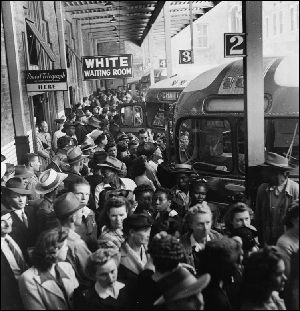American Exodus
American Exodus
The Warmth of Other Suns:
The Epic Story of America’s Great Migration
by Isabel Wilkerson
Random House, 2010, 640 pp.
 In the year or so before Woodrow Wilson’s administration took the United States into the Great War raging in Europe, Americans recognized that something unusual was taking place in communities across the South: African Americans were departing in unprecedented numbers for the North. While black and white contemporaries might have differed on the particulars, the outline they saw was clear. With the European war dramatically reducing the number of immigrants, labor-starved industrialists were tapping a labor force they had previously ignored or rejected. And since the vast number of blacks lived in the South, labor recruiters logically turned their attention toward that region. Advertising good jobs, high wages, and a level of personal freedom unknown in the land of Jim Crow, recruiters, black newspapers, and earlier migrants spread the word that exclusionary employment barriers were falling and that a land of hope now beckoned. In the first wave of what was called the “Negro Exodus,” a half million southern blacks headed North; in the decade after the war, another 700,000 followed. The Great Migration was on.
In the year or so before Woodrow Wilson’s administration took the United States into the Great War raging in Europe, Americans recognized that something unusual was taking place in communities across the South: African Americans were departing in unprecedented numbers for the North. While black and white contemporaries might have differed on the particulars, the outline they saw was clear. With the European war dramatically reducing the number of immigrants, labor-starved industrialists were tapping a labor force they had previously ignored or rejected. And since the vast number of blacks lived in the South, labor recruiters logically turned their attention toward that region. Advertising good jobs, high wages, and a level of personal freedom unknown in the land of Jim Crow, recruiters, black newspapers, and earlier migrants spread the word that exclusionary employment barriers were falling and that a land of hope now beckoned. In the first wave of what was called the “Negro Exodus,” a half million southern blacks headed North; in the decade after the war, another 700,000 followed. The Great Migration was on.
White Southerners cried foul, decrying northern agents for deceiving southern blacks, stealing their traditional work force, and bringing about what the New Orleans Times-Picayune called a “great labor famine.” Initially, they resorted to repression, harassing or arresting both labor agents and potential migrants; eventually, more enlightened if still obtuse whites suggested that something had to be done to “hold the labor needed for the growing [of] crops and the activity of our factories.” Some entertained the recommendations of those they called the “best class of the colored people”—the ministers and educators, who counseled the “dominant race that has the wealth and power in its hands to so change conditions as to make the South so attractive to the best negro labor that it will be glad to stay” in what ought to be “the garden spot of the world,” in one black bishop’s words. That meant addressing the “lack of a sense of security caused by mob violence” and the absence of “even-handed justice in the courts.” Black Louisiana educators attributed the migration to a “lack of consideration”; providing better schools, raising wages, and affording “good treatment and proper recognition” would relieve the white South’s problem. Entertaining suggestions and acting on them proved to be two different things, however. Those changes, as it turned out, would only come, and even then only partially, many decades in the future. The migration continued.
Had white Southerners genuinely wanted to understand the phenomenon that disrupted their e...
Subscribe now to read the full article
Online OnlyFor just $19.95 a year, get access to new issues and decades' worth of archives on our site.
|
Print + OnlineFor $35 a year, get new issues delivered to your door and access to our full online archives.
|






